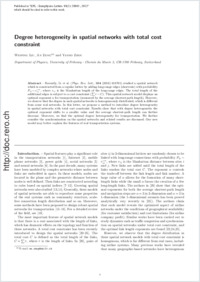Degree heterogeneity in spatial networks with total cost constraint
- Liu, Weiping Department of Physics, University of Fribourg, Switzerland
- Zeng, An Department of Physics, University of Fribourg, Switzerland
- Zhou, Yanbo Department of Physics, University of Fribourg, Switzerland
-
24.04.2012
Published in:
- EPL - Europhysics Letters. - 2012, vol. 98, no. 2, p. 28003
English
Recently, Li et al. (Phys. Rev. Lett., 104 (2010) 018701) studied a spatial network which is constructed from a regular lattice by adding long-range edges (shortcuts) with probability Pij~rij−α, where rij is the Manhattan length of the long-range edges. The total length of the additional edges is subject to a cost constraint (∑ r = C). This spatial network model displays an optimal exponent α for transportation (measured by the average shortest-path length). However, we observe that the degree in such spatial networks is homogeneously distributed, which is different from some real networks. In this letter, we propose a method to introduce degree heterogeneity in spatial networks with total cost constraint. Results show that with degree heterogeneity the optimal exponent shifts to a smaller value and the average shortest-path length can further decrease. Moreover, we find the optimal degree heterogeneity for transportation. We further consider the synchronization on the spatial networks and related results are discussed. Our new model may better explain the features of real transportation systems.
- Faculty
- Faculté des sciences et de médecine
- Department
- Département de Physique
- Language
-
- English
- Classification
- Physics
- License
- License undefined
- Identifiers
-
- RERO DOC 29648
- DOI 10.1209/0295-5075/98/28003
- Persistent URL
- https://folia.unifr.ch/unifr/documents/302531
Statistics
Document views: 66
File downloads:
- liu_dhs.pdf: 113
